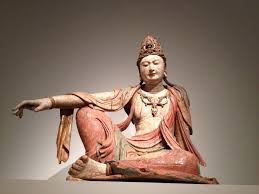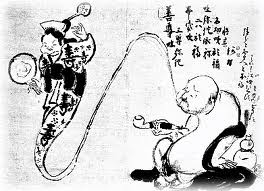The Seven Sisters by an Australian Aboriginal artist based on her people’s mythology
Yesterday I visited a friend of 40 years. I hadn’t seen him in years, but my GPS, depending on satellites and the math of relativity theory (that same set of equations that tell us a photon in a vacuum is in a universe of no time or space, well, forgetting about gravitational fields perhaps) got me right to his front door.
My friend, who is my age, has a kind of cancer that should have killed him and indeed was killing him. Chemotherapy failed, although it likely extended his life a bit. That was important because it enabled him to survive to try a new medication, one of the molecules scientists designed to fight cancer through sophisticated cellular targets. So far it is working; his tumors dissolved rapidly and as far as they can tell dramatically.
Science works. It is important not to subscribe to myths that will not allow for that. That is just crazy talk.
So my friend and I were talking about science and spirituality. He is very insightful, but he seemed to be stuck just a tiny bit on whether dark energy or dark matter was what one “sees” with the third eye in meditation.
Well, that’s why in Zen we tend to keep our eyes partly open when we meditate, so we don’t wade in the darkness and try to imbue it was some meaning that isn’t there!
Certainly to a scientist that third eye and dark energy/matter connection doesn’t sound right. “Dark” in dark matter and energy just means they don’t give off any light to show us what and where this matter and energy is. We don’t have instruments that can measure them directly. So they are dark to our senses. We “see” dark matter and energy by their effects on the cosmos, like the apparent expansion of space and the ways galaxies turn. Specific, measurable effects, that is.
As I wrote before, for example in the recent post about not being seduced by the cool in quantum, using science this way can just add noise and be distracting.
On the other hand, someone recently suggested a book to me “More Than Allegory: On Religious Myth Truth and Belief” by Bernardo Kastrup. I am only about a third into it. I don’t agree with all I have read, but there is some insight there, and it helped me in talking to my friend.
After all, what is a myth but how the intellect deals with ineffable, what is beyond words? Are myths literally true? Of course they are not. But do they express Truth? Many times, yes, myths can reflect our conditioning, desires and delusions and show us an intuitive view of a road out of our grasping, fearful, limited brains. Not all myths do that, perhaps most, simply codify cultural norms or personal biases. The best myths are how we talk about what we can’t talk about. Myths aren’t only what we tell ourselves in the absence of fact, they are a place we go recognizing that language and intellect are limited by the scale they evolved at.
As written in the foundational Song Dynasty Zen poem “The Identity of the Relative and Absolute” in the translation we chant at Hazy Moon Zen Center (I believe by Maezumi Roshi via ZCLA) “reading words you should grasp the great reality.”
When I started writing non-fiction about science and Buddhism I called my work “Chasing Phantoms.” The title was based on the story of Laplace’s last words. Laplace was one of the top, if not the top, mathematician and scientist at the end of the 18th and the beginning of the 19th century; the “Enlightenment” in Europe. He was sometimes a theist, sometimes an atheist, always brilliant. On his deathbed somebody said to Laplace, “wow you must feel good about having been such a smart guy, accomplishing so much in math and science.”
Laplace replied, “Well, we do chase phantoms, don’t we.” Then he died.
The word he used for phantoms in French was “chimeras.” Stuff we cobble together. Stories we put together from different things in our experience, things we perceive, to make a new thing, a story. A myth.
So while I started suggested to my friend that he might not want to waste his time meditating by looking for dark energy in his third eye, I backed off a bit. Why not go there? Not a bad myth, though I am leery about mixing myth and specific scientific observations and terminology. Like a mixed metaphor, it doesn’t sound quite right to me. Also as a scientist, the situation is not symmetrical. Maybe I can mix science into myth, but it is not acceptable to mix myth into science, if you want your GPS to work, and if you don’t want to do stupid stuff like deny climate change, over population, pollution, thereby threatening civilization. Be careful you don’t lay your delusional myths born of greed anger and ignorance on science.
Yet I relish myth and I love science. Many of the sutras contain myths, stories that are not necessarily literally true but aren’t merely or solely allegories. The Avatamsaka sutra (and others, but I happen to be looking at that one) is full of elaborate images. There is’t a literal Mount Sumeru on earth. I love referring to Guan Yin, the bodhisattva of compassion, and stories of her going down to hell hearing the cries of the suffering. I dig the story of Buddha putting up with his murderous cousin and trying to stop a war and failing. I act as if true, though I understand they are not “verified” by archaeology or written contemporaneous sources. They aren’t academic history or scientific experiments or even mathematical models. As Nyogen Roshi says, they are about you. Like myths.
Did Shakespeare write Shakespeare? I think so, but then again, really, who cares? Whatever myth you believe about who wrote the plays isn’t critical to me. If some new facts come to life, I’ll change the myth in my head. Until then Shakespeare is a myth that works for me. It doesn’t for others. Above all, the play’s the thing… (paraphrasing Shakespeare), and all these are just such as dreams are made of (oops did it again).
At its furthest reaches science is myth. That is, we take observations and cobble together a story that supplies a deeper understanding beyond the limits of data retrieval. That is just what myth does.
While I do not always realize I am myth making in my head, being a scientist and all, I very consciously wrote a myth when I wrote my novel for kids with the express purpose of creating chimeras full of heart and meaning (“Aidan and the Dragon Girl Save the World”). The novel I chose to write isn’t a work of science fiction (the obvious choice one might think given my background in medicine and science), it is a fantasy, a dream; it is a myth. And like myth, the story works best, as does all fiction, if you take it as true when you are reading it.
Hakuin Zenji understood the value of myth
The tetralemma, basic to Buddhist logic says of such Truths, the chimeras, all belief systems the human mind cobbles together, including dogmatic Buddhism, not true, not not true, not both true and not true, not neither true nor not true.
That is Myth.
Now, in Zen, in the original, earliest Chan writings that we have, we are to cease notions. I get that. We are easily misled, easily seduced by stories and usually they are there to serve our egos. Dualistic distractions. So fine, maybe I am a bit off base here. On the other hand, as Nyogen says, much of practice consists of gimmicks designed to shake up our parochial views, our day-to-day delusions, to push us beyond our conditioning. Maybe used right myth is upaya, skillful teaching. A piece of the raft we cling to to get to the other shore, in Buddhist jargon.
So if my friend likes shutting his eyes and picturing dark matter in the depth and silence of his third eye, maybe it’s not so bad. I mean, it could be worse, he could have decided string theory is the multidimensional Buddha.





Interesting read, especially the reference to Laplace. Made me think about how I perceive myth.
Already looking forward to reading your other posts.
Thanks Oliver!
You’re welcome.
Keep up the work. Yours is definitely one of my favorite blogs.